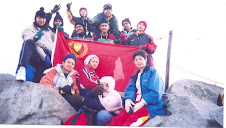Kedah LC has successfully organised it's tutors' dialogue for Semester May 2008 on the 3rd day of that month. This time around we focused on specific issues relevant to tutoring & administration of tutors. Prof. Dr. Mansor Fadzil, SVP and Puan Nik Azlina Yaacob, Head of Tutor management Unit were present. Prof. Dr. Mansor Fadzil shared his experience visiting other OUs in all continents.
Adapting a mini workshop format, we briefed tutors on their performance in OLP, OMES & TMA Online. We choose 2 tutors to share their experiences.

Later during the day, tutors were grouped in 3 big groups and they were given 3 different issues to discuss, react & make constructive suggestions to improve, in the best interest of OUM students.
ISSUE 1 – Are we coaching or tutoring?
Coaching and tutoring are both teaching and learning processes that enable individuals to achieve their full competency with reference to skills, knowledge and attitudes potential. Both have many similarities. They may be approached and undertaken in a paid (professional) or unpaid (philanthropic) context.
Coaching and tutoring both perform three broad functions. They facilitate the exploration of needs, motivations, desires, skills and thought processes to assist the individuals in making real, lasting change. Both use questioning techniques to facilitate students’ own thought processes in order to identify solutions and actions rather than take a wholly directive approach. In addition, both support the students’ in setting, achieving appropriate goals and methods of assessing progress in relation to these goals.
Therefore, coaching can be defined as a process that enables learning and development to occur and thus, performance to improve. To be a successful coach, a coach requires knowledge and understanding of process as well as the variety of styles, skills and techniques that are appropriate to the context in which the coaching takes place. Whereas, tutoring can be defined as help, tuition and guidance of one person by another in making significant transitions in skills, knowledge, work or thinking.

However, it was noted that to draw a clear distinction, between coaching and tutoring is impossible. The elements in both the columns overlap and are derived based on key roles played by tutors at OUM. The conclusion is that, all tutors play dual roles; coaching and tutoring.
Three pitfalls emerged in our discussion. Firstly, coaching has to be continuous, need longer contact hours and the availability of facilities. Secondly, poor students’ attendance contributes to ineffective coaching and tutoring. Thirdly, the syllabus and scope of subject matter is too wide. Very often, content is being repeated especially for the TESL subjects Literature versus Teaching Literature, Listening / Speaking versus Teaching of listening / Speaking etc
ISSUE 2 - TMA feedbacks and comments : can we do better?
ISSUE 3 - i) Our Role : Students using TMA feedback to upgrade their marks
ii) OLP : Are we really participating ?










No comments:
Post a Comment